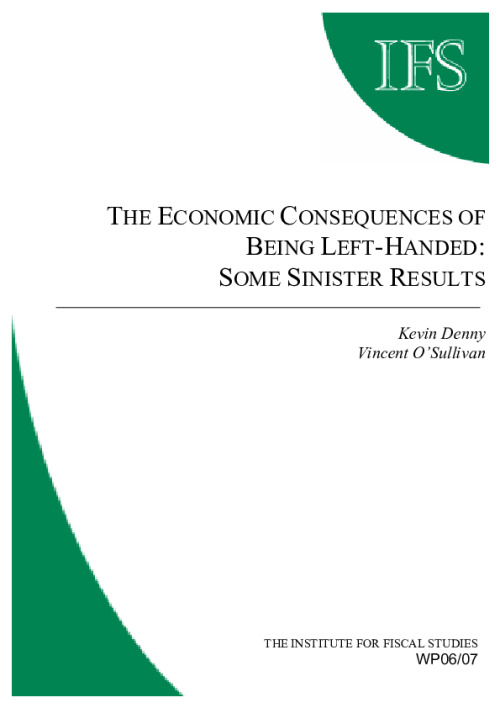Downloads

wp0607.pdf
PDF | 1.57 MB
This paper provides the first estimates of the effects of handedness on hourly earnings. Augmenting a conventional earnings equation with an indicator of left handedness shows there is a well determined positive effect on male earnings with non-manual workers enjoying a slightly larger premium. These results are inconsistent with the view that left-handers in general are in some sense handicapped either innately or through experiencing a world geared towards right-handers. The results for females however reveal the opposite, left-handed females are paid significantly less. This is consistent with some psychological evidence which suggests that left-hander males have particular talents such as enhanced creativity and some evidence on brain morphology which also suggests advantages for left-handed males.
Authors

Kevin Denny

Vincent O'Sullivan
Working Paper details
- DOI
- 10.1920/wp.ifs.2006.0607
- Publisher
- IFS
Suggested citation
Denny, K and O'Sullivan, V. (2006). The economic consequences of being left-handed: some sinister results. London: IFS. Available at: https://ifs.org.uk/publications/economic-consequences-being-left-handed-some-sinister-results (accessed: 30 June 2024).
More from IFS
Understand this issue

If you can’t see it, you can’t be it: role models influence female junior doctors’ choice of medical specialty
24 April 2024

Sure Start achieved its aims, then we threw it away
15 April 2024

The NHS waiting list: when will it come down?
29 February 2024
Policy analysis

How do the last five years measure up on levelling up?
19 June 2024

The Conservatives and the Economy, 2010–24
3 June 2024

A decade and a half of historically poor growth has taken its toll
3 June 2024
Academic research

The impact of labour demand shocks when occupational labour supplies are heterogeneous
28 June 2024

Labour market inequality and the changing life cycle profile of male and female wages
15 April 2024

Interpreting cohort profiles of lifecycle earnings volatility
15 April 2024